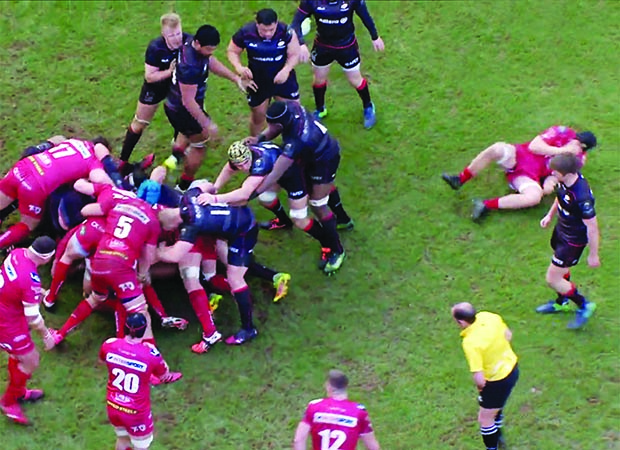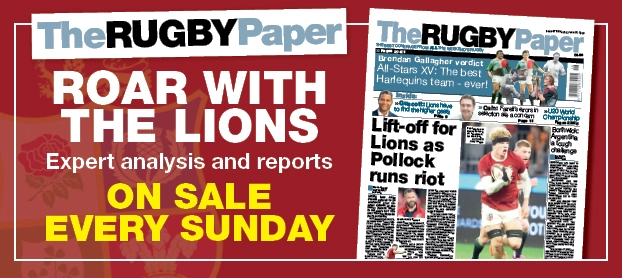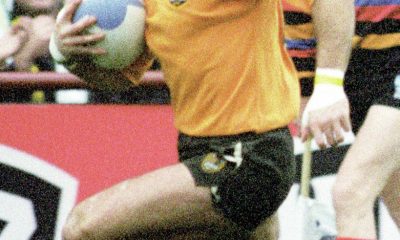
 With the excitement of the closely-fought battles for Champions Cup quarter-final places in this year’s competition, it would be easy to think that everything is fine with the game here in England – and generally speaking it is.
With the excitement of the closely-fought battles for Champions Cup quarter-final places in this year’s competition, it would be easy to think that everything is fine with the game here in England – and generally speaking it is.
The top level of the club game is flourishing and our international team is currently the second best in the world, preparing to go to the top. If Eddie Jones‘ England can maintain the winning formula, with the players bought in for the injured and those back from injury to win a back-to- back Grand Slam, who knows what records could fall?
There is just one cloud that dims the bright sky of England rugby and that is a report released last week indicating an increase in verbal abuse directed at match officials.
RFU rugby development director, Steve Grainger, blames it on the influx of new players following the World Cup and a lack of understanding of the ‘culture’ that rugby believes (well the RFU at least) is historically a preserve of the game.
This is an idealised vision of the game in which all players and spectators are gentlemen with impeccable manners who would never question a referee’s decision and would always accept whatever he said.
If only that were true!
Any parent who has watched their children playing in a school match will testify to the fact there has always been a few parents who were, to put it mildly, slightly ‘over the top’ in their encouragement to their children and berating the referee if he penalised them.
While standing pitch-side watching my children play I lost count of the number of times I had parents telling me how wonderful their son or daughter was and how they had had them measured and knew they would one day grow big enough to play for England.
Failure to gain selection in the schools age-group county teams was always down to a corrupt system that favour those whose parents could afford to send them to the ‘right’ school and while there was, and still is, an
element of truth in that assumption, mostly it was just that their child wasn’t good enough.
When it comes to the adult game, referees were much more inclined to punish any backchat with a ten-yard penalty than they are now, in fact, I cannot remember the last time I have seen a referee use it.
There is certainly more talking from the referee and the players than there used to be, so you would expect to see more teams marched back, but you don’t.
It could be that referees are aware the goal-kicking range has increased and are reluctant to be accused of influencing the result of games, or the new chatty style is seen as ‘positive game management’ by those in charge of the various Unions who are trying to sell as many ‘ref links’ as possible.
It would have been a waste of time having a ‘ref link’ in the past as referees were not expected to explain decisions, so many never entered in to conversation, they just stated what was what and expected each team to accept it.
The major increase in verbal abuse has nothing to do with a change in the demographic as Grainger suggests, as in fact the game has shifted back to its traditional roots with an increase in public schools and fewer state schools with rugby part of their sporting curriculum.
The increase in back chat in the adult game was bound to filter down to the youth game, as young players see their heroes openly questioning referees at almost every instance.
This happens time and again at the breakdown, where questioning the release or non-release of the ball is now standard practice in the attempt to gain a penalty. There is now the element of play-acting to get players carded – such as James Davies for Scarlets against Saracens last week – and many other tactics that are designed to pressure referees, such as applauding when they yellow-card opponents.
As for those watching senior rugby, the Premiership clubs they support try to follow football where fans are encouraged to be club fans specifically, not fans of the sport generally.
The clubs want to guarantee a loyal fan base who will attend week after week rather than going to the ‘best match’ in the area as they used to.
For the parents of those in the youth game, the pressure to succeed is much more intense as the chance of an academy place is reliant on success in the schools county system or being at an academy-linked school.
When I was watching my children, the game was amateur so parents who were desperate to believe their child could make it to international were only interested in the sport. Now we are talking about your child’s career.
Unlike Grainger, I do not believe the current crop of parents are new to the game – in fact I would dare to say the reverse is true. They are parents who understand rugby and believe their child is good enough to make it in the professional game and woe betide anyone that gets in their way.

Women's International
Sadia Kabeya is ready to have fun as the Red Roses seek World Cup glory on home soil






























You must be logged in to post a comment Login